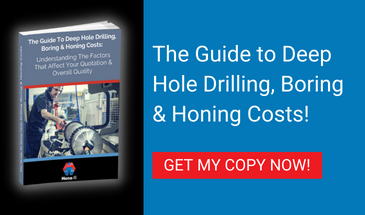
In aerospace manufacturing, the choice of metal makes a big difference. This is because different metals behave differently when under stress, when heated, and when cooled. The characteristics of metals have a strong influence on manufacturing techniques, such as deep hole boring and gundrilling. Here’s a quick guide.
Aluminium
A very light metal, aluminium helps to reduce the overall weight of an aircraft. Aluminium is a naturally occurring metal, making up at least 8 per cent of the earth’s soil and rock. It is nonmagnetic and nontoxic, and has good malleability. It also retains its strength in very cold temperatures, which makes it ideal for aircraft skins.
Aluminium presents a few mechanical challenges. Its easy workability means that attempting to bore into it can create spaghetti-like threads that can damage machinery, tooling and also impact the quality of the bore. A careful, measured approach is therefore required for this useful metal.
Steel
Steel is one of the best-known alloys of iron and carbon. As an alloy, it is both stronger and less reactive than iron, meaning that it does not rust. This makes it ideal for exposed plane parts such as landing gears. Over 3,500 different grades of steel are available, and these depend on the ratio of carbon to iron and the heat treatment used in the creative process.
Steels are valued for their high tensile strength. However, this can also pose an engineering challenge. Drilling through steel can create heat, which may affect tolerances achieved. As such, a comprehensive knowledge of achievable parameters is required and for extremely tight tolerances, time for normalisation of the material is necessary.
Titanium
Titanium is one of the strongest metals on earth and is also one of the least problematic in terms of reactivity. When exposed to O2, titanium instantly forms a protective oxidised shield, meaning that it does not easily corrode. This makes it very useful for aerospace components, particularly within vacuum systems. Its high strength means that it is also widely applied in precision industries, such as medical equipment manufacturing.
Its strong performance also makes titanium a fairly difficult metal in the workshop. It tends to overheat, so it must be honed very slowly and again, allowed to cool ater machining to guarantee closer tolerance parameters.
Nickel Alloys
Nickel is an important metal that alloys well with a variety of other metals. This offers high levels of control to manufacturers, who have a vast palette of combinations to choose from. Nickel is highly resistant to heat and corrosion, making nickel alloys the metal of choice for aircraft gas turbines and similarly demanding environments.
Due to their diversity, working with a nickel alloy requires machinists who understand its chemical composition. The extent to which two metals are bonded is called their ‘solubility’. Solubility is very strong in nickel-copper alloys, while bonds with other metals such as chromium or iron are less robust. This affects factors such as heat transfer, malleability, and the speeds and feeds required for drilling.
Find Out More
Hone-All are the experts in machining all of these aerospace materials and a wide variety of others and are knowedgable and experienced in achieving the very best possible results in the most efficient manner. To learn more about Hone All’s quality approach to aerospace manufacturing, please call 0845 5555 111 today.
Image Source: unsplash.com






